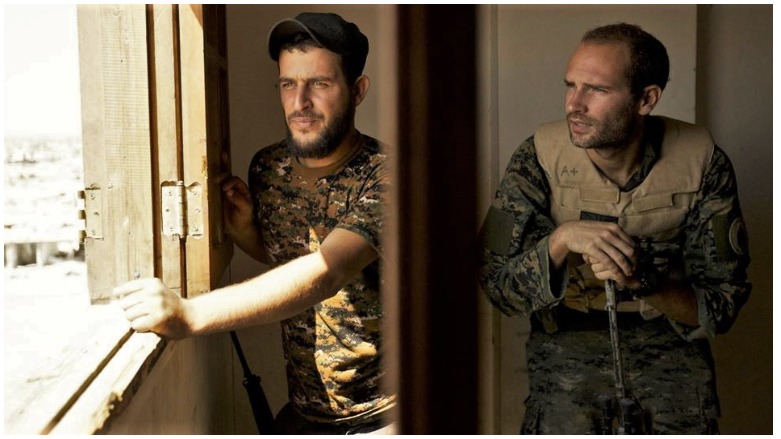New book documents Kurdish struggle against the Islamic State
British volunteer Macer Gifford has fought in three long tours of duty against the Islamic State in Syria, including during the battle for the extremist group’s capital of Raqqa in 2017.

ERBIL (Kurdistan 24) – British volunteer Macer Gifford has fought in three long tours of duty against the Islamic State in Syria, including during the battle for the extremist group’s capital of Raqqa in 2017.
Now, he has written a memoir about his experiences. The book is entitled Fighting Evil: The Ordinary Man who went to War Against ISIS and was published in late May.
“I was thinking about it for a number of years. Because, more than anything, I wanted to tell my story, because there’s only so much time that you’ve got in front of an audience or in front of a TV camera to really talk about what you got up to, and what you experienced,” Gifford told Kurdistan 24.
“So, this was a desire to retell my story so people could understand what the international volunteers go through, but it’s a little bit more than that as well. I also wanted to tell the story of the development of the YPG (People’s Protection Units) and the Kurdish struggle against the Islamic State and their eventual victory.”
Gifford recognizes that, while in Syria, he witnessed history in the making.
“The heroic people of northeastern Syria liberated themselves and I watched them do it. So, it was a real privilege, and that’s what I wanted to write about.”

He is not the only volunteer from the UK to write about his experiences. British Kurd Azad Cudi has also written a book about the snipers of Kobani and Jim Matthews, a former soldier, also wrote a personal story about his time as a volunteer in the battlefield fighting against the Islamic State.
“Volunteers are unique. They’ve got their own story, they’ve got their own reasons for being there, and they’ve got their own experiences while they’re there, as well,” Gifford said. “So, the books will be fundamentally different.”
“I went primarily not just to be a fighter, although I would fight across northern Syria in many different places. I also went as an activist as well; someone who would battle for the Kurds back home in the West.”
While some volunteers returned to their normal lives, Gifford is still quite active as a human right activist and campaigner.
“I knew I had an intense amount of privilege in the West, everything from my education to my background, to my contacts; the people that I knew would listen to me. I knew I had to utilize for good.”
“This book is really an account of the three years that I spent fighting ISIS,” he continued. “It covers some of the worst fighting and the most bloody fighting in Syria and it’s… it’s an intensely sad story in some respects because of the suffering and the deaths of many different people in the book. But, also it’s a story of hope because it also talks about the most amazing people on the planet, both Kurds and internationals, who stood up for the right reasons and who went for the right reasons to fight ISIS and were ultimately victorious.”
Gifford says he wants to change some misconceptions that people have about Kurds in Syria.
“I think one of the challenges that the Kurds have always had is that they’ve had a bit of a PR (public relations) problem which has improved vastly over the years. Groups like the Rojava Information Centre; they are amazing and do amazing work on spreading news from Rojava (Syrian Kurdistan) to the west.”
However, when Gifford first joined there was no such centre and the SDF slowly started to organize itself from the time of the battles in Kobani until Raqqa, much later.
In the end, Gifford says he has no regrets about going to Syria. “I think one of the last lines in the book is that what I achieved in Rojava was what I actually wanted to achieve. I saw an opportunity to help the Kurdish people and (all) the people in northeastern Syria. And I felt like I’ve done that.”
With the book, Gifford also wants to appeal “to just ordinary people who have not heard about the fight against the Islamic State, who have not heard about the Kurds. This book will be a journey for them as well to really understand who we’re fighting against, who we are fighting for, and what we did. That’s really important.”
Editing by John J. Catherine